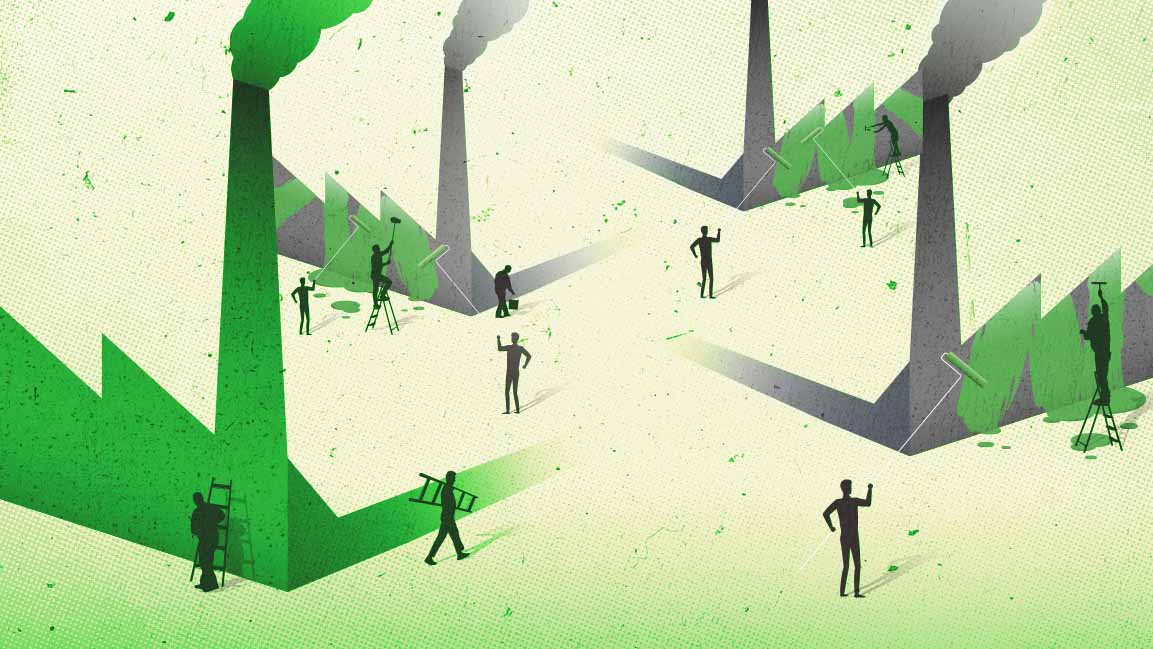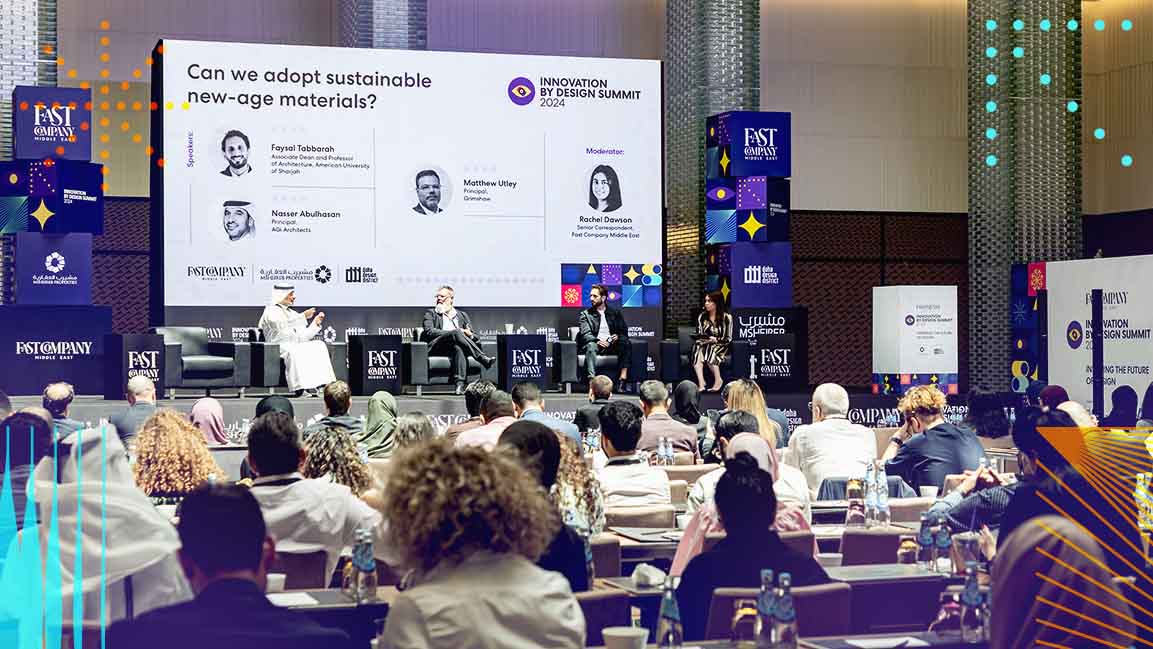- | 9:00 am
Can the Middle East drive innovation to be a climate tech hub?
At the second edition of Fast Company Middle East’s Green Goals Summit, industry leaders discussed how innovation can drive a sustainable future.

The climate crisis, a multifaceted challenge demanding urgent sustainable solutions, is being addressed through climate technology. Innovations in renewable energy, sustainable agriculture, transportation, and urban planning are pivotal forces driving transformative change.
At the second edition of Fast Company Middle East’s Green Goals Summit, industry leaders shared insights on how the Middle East and North Africa region is evolving into a climate tech hub. The panel, titled “Climate Tech Transformation: Driving Innovation for a Sustainable Future,” provided valuable viewpoints.
Professor Derya Baran, Co-Founder & Chief Engineer Officer of RedSea, a startup dedicated to creating intelligent and sustainable energy solutions for harsh climates, began the conversation by emphasizing that this region is “the place to be the climate tech hub, and there’s no other opportunity that can come for a long time.”
However, she believes there is a need for more education in the region regarding the meaning of sustainability.
Buddhi Paranamana, Director of Sustainability & Innovation at PDS Limited, echoes this sentiment, noting that the region is a “place for you to look at innovation and see how you can then adapt it into a much larger scale.”
“Innovation being adapted into the supply chain that is emerging from the more traditional manufacturing markets, particularly the Eastern markets at the moment, this is where we need to drive a bit more aggressively in adapting it to the manufacturing field,” he adds.
Meanwhile, Dr. Hamid Haqparwar, Managing Director of BMW Group Middle East, believes the region possesses all the necessary elements to lead climate-friendly technologies. Addressing the automotive industry, he highlights the region’s abundance of oil and solar energy, which facilitates the production of climate-friendly resources such as aluminum.
“I think the endeavor to become more climate-friendly as a consumer is much faster because mobility is an essential part of humankind. We need to be mobile,” adds Dr. Haqparwar.
INNOVATION AND COLLABORATION
In their global stocktake, the United Nations Framework Convention on Climate Change notes that “much more is needed on all fronts,” but it emphasizes that it can be achieved.
“Without collaboration, it doesn’t work. That’s why we have COP28 here, where many countries are collaborating to work towards a common goal. I think that’s the beginning, implementation, and follow-up,” says Dr. Haqparwar.
For example, adopting electric vehicles requires collaboration between manufacturers providing the product and companies like DEWA for charging infrastructure. Additionally, government entities must collaborate with manufacturers, offering incentives and establishing regulatory frameworks to support this transition.
The drawback is that being climate-friendly is more expensive, but Dr. Haqparwar notes that with economies of scale, it’s an investment in the future. “If you look at three years ago, there were hardly any electric vehicles on the road. Now there is, and obviously, the price points will come down and are coming down.”
Paranamana suggests that it’s not a matter of assessing how well we are doing but rather what needs to be done. “It’s about how we now course correct and who needs to take that initiative and who needs to be in charge of the first few steps.”
Regarding collaboration, he emphasizes the need for more encouragement between nations with resources and those without. “Countries might be willing to take the necessary steps but lacking the resources.”
POLICY REGULATION
Over 70% of the world’s freshwater is used unsustainably in agriculture, where it’s utilized once and then gone. In the region, technology is being integrated into agriculture to mitigate food waste and enhance food security amid climate change.
Professor Baran highlights climate-controlled agriculture, like greenhouses, as a solution for addressing water scarcity in hot climates in the MENA region. She emphasizes the significant challenges one billion people face in deserts and four billion in freshwater-scarce areas. Baran stresses the need for adaptation technologies, stating, “People want to save the future, but today, we have a lot of work to do.”
The agritech industry requires additional support from policymaking and governments to facilitate technology adaptation to achieve these goals. Professor Baran emphasizes the need for communication between scientists and policymakers, urging them to engage in meaningful conversations to advance the industry.
“In the Middle East, especially in Saudi, governments subsidized a lot of solar energy, but that’s not the way. It would help if you incentivized the technologies so that they can adapt quickly and scale up so that the price point again comes down,” she adds.
Dr. Haqparwar notes that the innovation process for sustainability is a dialogue, and the region benefits from policymakers who are attentive to societal needs. He contrasts this with other parts of the world where stringent regulations can stifle innovation. Haqparwar emphasizes the importance of providing businesses with flexibility, allowing them to beta-test innovations in a sandbox model.
SUSTAINABLE AUTOMOTIVE MANUFACTURING
Electric vehicles are a facet of a climate-friendly future in the automotive industry. Another critical aspect involves addressing the scarcity of materials required for vehicle production, including primary materials like aluminum and steel and rare earth materials such as silver, nickel, and palladium—all of which require mining.
Dr. Haqparwar emphasizes that humans consume approximately 100 billion tons of primary materials annually, which must be reduced to achieve true sustainability.
We operate in a linear economy—mining, producing, using, and discarding. The imperative shift is towards a circular model, focusing on increased recycling.
Dr. Haqparwar endorses designing and building vehicles with recycled materials, highlighting that achieving more than the current 30% recycling rate is contingent upon steering the vehicle design and production in this direction.
BREAKING DOWN BARRIERS
Implementing and adopting climate technologies has limitations and financial, regulatory, and market challenges.
Paranamana addresses these challenges by establishing a venture capital fund within his company and directing investments into sustainable technology and startups. Engaging with startups at their early stages, particularly the concept and pre-seed stage allows for industry-specific guidance to scale innovations and ideas effectively.
“Majority of the time, we realize that there are amazing ideas, but then after taking it to scale at a commercial stage, it becomes very challenging for various reasons,” he mentions.
Dr. Haqparwar notes the existing government framework and a growing awareness among people. He suggests that if consumers make more sustainable choices and incorporate them into their daily lives, businesses will take notice and offer products aligned with consumer demands.
Moreover, Baran says that to begin with, the food industry needed to be designed to be more sustainable. It was designed to bring food to people in an affordable, safe, and lasting manner.
“I will be looking forward, in my lifetime, to witness which governments, countries, and regions will take that step. They will be the leading innovators and pioneers in this journey all our lifetime.”








































